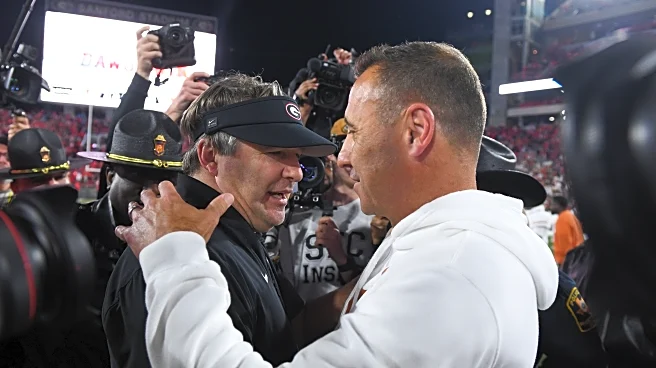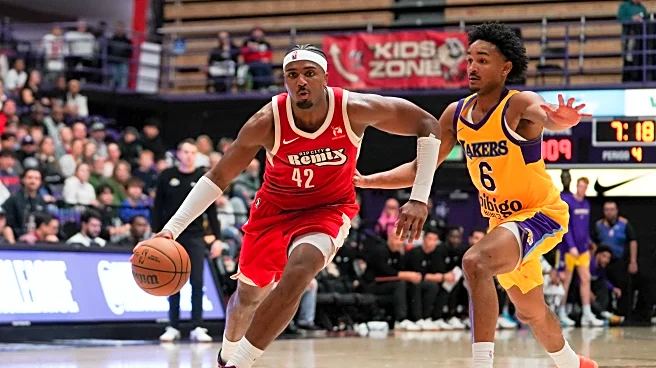In the last 13 months, the Texas Longhorns have lost three high-profile contests against the Georgia Bulldogs.
The first loss knocked the Longhorns out of the No. 1 ranking. The second loss cost Texas an SEC championship.
Combined, the defeats t0 Kirby Smart’s Bulldogs forced the Longhorns to play a first-round game in the College Football Playoff, contributing to injury attrition that reduced the margin of error in the Cotton Bowl loss to the Buckeyes.
On Saturday, the playoff hopes of No. 10 Texas
took a devastating blow as No. 5 Georgia scored 21 unanswered points in the fourth quarter of a runaway 35-10 victory in Athens, a final 15 minutes that Texas head coach Steve Sarkisian aptly termed a “disaster.”
For a Longhorns program setting a high standard its fifth-year head coach, Texas is hitting a hard ceiling trying to get past Smart’s Georgia, with Saturday’s defeat officially establishing that Sarkisian has a Kirby Smart problem.
A lot of SEC opponents have a Kirby Smart problem — with the demise of Nick Saban’s Alabama dynasty, cemented by the Texas win in Tuscaloosa in 2023, Georgia has become college football’s premier program.
Ole Miss head coach Lane Kiffin believes that “dynasties are over” with the SEC expanding its conference schedule to nine games and with NIL and the transfer portal and revenue sharing reducing the advantages of blue-blood programs.
“He says a lot.”
Asked about Kiffin’s statement last week, Sarkisian’s observation about Kiffin was certainly accurate, and as the Texas head coach went on to question more stringent definitions of a dynasty, he noted that Smart’s results in Athens speak for themselves.
After a five-loss season in Smart’s 2016 debut, the Bulldogs have gone 106-15, losing the national championship game in overtime to Saban’s Crimson Tide in his second season before breaking through with back-to-back titles in 2021 and 2022.
Smart’s own standard is set so high that the three-loss season in 2024 that included an SEC championship but ended with a defeat by Notre Dame registered as a significant disappointment.
In 2025, the Bulldogs are vulnerable enough to lose at home for the first time since 2019 and have to battle through other close contests. Still, calling Georgia vulnerable only comes within that larger context of Smart’s succes in Athens.
For Sarkisian, the gap between the program he’s building and the program his close friend Smart has built appears significant.
Consistently stellar recruiting classes brought to Austin, including the No. 1 class in 2025, have produced a blue-chip ratio of 78 percent compared to 84 percent for Georgia, but the 21-point fourth quarter by the Bulldogs illustrated the difference in execution between the two teams.
“It was a pretty good game for three quarters, and it was not a great game in the fourth quarter, at least not for us,” Sarkisian said in his post-game press conference.
After Texas narrowed the margin to 14-10 when an interception by junior linebacker Anthony Hill Jr. turned into a touchdown, Georgia’s response benefitted from self-inflicted wounds by the visitors.
Eschewing the conservatism typical of head coaches with a defensive background, Smart went for a 4th and 1 from his own 36-yard line. Oft-maligned offensive coordinator Mike Bobo made the right call, sending running back Chauncey Bowens into the flat on a play-action pass and picking up 10 yards, but it only worked because Texas busted its coverage.
“We didn’t defend the play very well. It’s unfortunate because we actually practiced that play,” Sarkisian said.
Consider that an indictment of how Texas translated its preparation into execution coming out of a bye week.
Three players later, the Longhorns had another chance to get off the field defensively, but suffered a mental mistake when sophomore edge Colin Simmons, one of the team’s best players, jumped offside on a play that ultimately resulted in an incompletion by Bulldogs quarterback Gunner Stockton.
“That’s just mental intensity and focus,” Sarkisian said.
As the grinding drive by Georgia spanned quarters, the second play of the final frame featured Texas redshirt senior safety Micheal Taaffe and senior cornerback Jaylon Guilbeau both defending the same switch release, allowing an easy 30-yard touchdown pass for Stockton to London Humphreys.
Given Taaffe’s well-earned reputation for communicating effectively before the snap and knowing his assignment after the snap, it was a shocking busted coverage in a game that featured too many missed assignments for the Longhorns in the secondary as Stockton threw for 229 yards and four passing touchdowns.
Smart’s ability to make aggressive, effective decisions based on his staff’s preparation paid off again when he called a gutsy onside kick that Georgia executed well and Texas executed poorly following the touchdown pass to Humphreys with the margin at 11 points.
With the front line of the Longhorns kickoff return unit dropping as the Bulldogs kicker approached the football, Georgia converted its advantage when Texas freshman safety Jonah Williams showed a shocking lack of contact courage going after the live ball, weakly conceding the recovery.
“We didn’t break on the ball, and that’s on us as coaches — we’ve got to do a better job of getting our players understanding situational football. We can go attack the ball, and we have an opportunity to get great field position in that situation, and we didn’t take advantage of it,” Sarkisian said.
The play left Texas special teams coach Jeff Banks muttering into his headset seeking answers to what happened. Making $1.2 million this season, Banks has had his special teams units exposed in the last two losses to Georgia after the Bulldogs successfully executed a fake punt in the fourth quarter of the SEC Championship game that led to a go-ahead field goal to close a drive that took 9:22 off the clock.
Most embarrassing for the Longhorns on that particular gaffe? Banks and his punt return unit failed to recognize the risk of a fake punt with the Georgia starting punter injured and his replacement on the field for that play having never attempted a punt in his six-year college career.
On Saturday, the Bulldogs used the onside kick recovery to take 5:27 off the clock on a nine-play, 53-yard drive that sealed the victory, showcasing Georgia’s ability to play complementary football, a sign of situational awareness and good coaching.
For Texas, the inability to do the same was glaring.
The Longhorns had to settle for a field goal on the opening drive when a false start in the red zone put Texas off schedule and Manning threw an interception in the red zone in the second quarter that took more points off the board.
Throughout the first half, dropped passes by Longhorns pass catchers hurt Texas, including one by sophomore wide receiver Ryan Wingo on the first drive to force the field goal and consecutive drops by sophomore tight end Jordan Washington and junior wide receiver DeAndre Moore Jr. early in the second quarter after Georgia scored its second touchdown to take a 14-3 lead.
The drops came after a bad holding penalty on senior center Cole Hutson negated an eight-yard run to open a drive pushed back towards the Longhorns goal line when junior cornerback Warren Roberson was flagged for an unnecessary holding penalty that destroyed a 59-yard kickoff return by redshirt sophomore running back/wide receiver Ryan Niblett.
Losing plays.
“We had some self-inflicted wounds in there where I felt like we had a pretty good plan, but we weren’t able to stack it all together to make it all work. You’ve got to play complementary football in games like this and our inability to do that in the first half was was pretty glaring,” Sarkisian said.
The lack of eye control and discipline on defense was also glaring for Texas, especially on bootleg plays when defenders weren’t able to find Georgia pass catchers leaking out the back door, contributing to poor red-zone defense — after allowing five touchdowns on seven red-zone trips over the previous two games, the Longhorns gave up touchdowns on all four red-zone trips by the Bulldogs on Saturday.
“We’ve got to get back to playing better red-zone defense — I think that’s probably the biggest thing,” Sarkisian said.
That might be the biggest thing defensively, but the overall problems, especially against Smart and the Bulldogs, are much more extensive.
“You’ve got to play all 60 minutes and you’ve got to tie it all together from the front end to the back end, and you need all three phases, and we weren’t able to do that tonight,” Sarkisian said.
Texas wasn’t able to do it in the last two matchups, either, and Sarkisian has now failed to break through in the vast majority of the biggest games the Longhorns have played in his tenure.
That’s a problem, and no other problem looms larger right now than Sarkisian’s Kirby Smart problem, which puts a hard ceiling on what Texas can achieve in the SEC and ranges from worsening the team’s seeding in the College Football Playoff to making it unlikely the Horns will receive a bid at all.
Given the magnitude of that problem, it’s going to force Sarkisian to take a long, hard look at himself and all aspects of his program during the offseason.
















